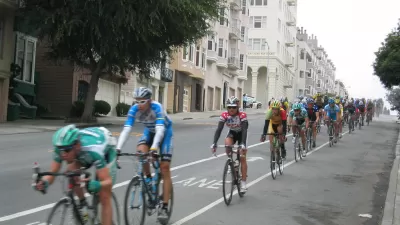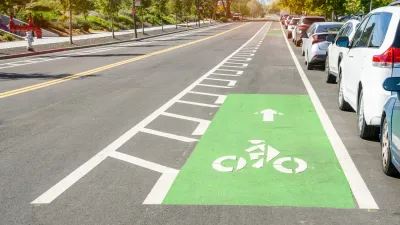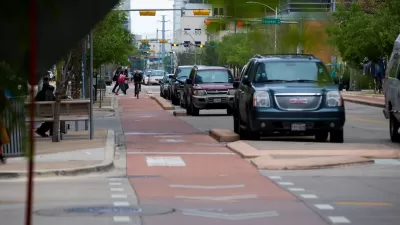A project touted as the "largest pop-up bike grid in the world" achieved rare levels of success on getting people on their bikes in Macon, Georgia.
"Last September, the town of Macon, Georgia installed a network of temporary bike lanes," according to an article by Helena Kotala. "In the two weeks that the lanes were up, bike traffic increased by nearly 900 percent."
The project, known as Macon Connects, was the brainchild of NewTown Macon, a non-profit that’s primary goal is to revitalize the downtown of the city. Macon was awarded $150,000 to complete the project through the Knight Foundation's Cities Challenge, a nationwide competition launched in 2015 to generate ideas to improve cities. Macon was one of 45 cities to receive funding in 2016.
The article presents the project, and its stunning results, as proof of concept that bike ridership can be achieved with a complete network of safe riding options. "In the past, the city government had put up three non-contiguous blocks of bike lanes and then claimed no one rides," explains Kotala.
The temporary experiment led to some major changes in the ways the city plans and engineers its streets.
Hat tip to Angie Schmitt for sharing the news about the success of Macon Connects. More information on the project is also available on the Newtown Macon website.
FULL STORY: If you build it, they will ride: pop-up bike lanes prove that demand exists

Maui's Vacation Rental Debate Turns Ugly
Verbal attacks, misinformation campaigns and fistfights plague a high-stakes debate to convert thousands of vacation rentals into long-term housing.

Planetizen Federal Action Tracker
A weekly monitor of how Trump’s orders and actions are impacting planners and planning in America.

San Francisco Suspends Traffic Calming Amidst Record Deaths
Citing “a challenging fiscal landscape,” the city will cease the program on the heels of 42 traffic deaths, including 24 pedestrians.

Defunct Pittsburgh Power Plant to Become Residential Tower
A decommissioned steam heat plant will be redeveloped into almost 100 affordable housing units.

Trump Prompts Restructuring of Transportation Research Board in “Unprecedented Overreach”
The TRB has eliminated more than half of its committees including those focused on climate, equity, and cities.

Amtrak Rolls Out New Orleans to Alabama “Mardi Gras” Train
The new service will operate morning and evening departures between Mobile and New Orleans.
Urban Design for Planners 1: Software Tools
This six-course series explores essential urban design concepts using open source software and equips planners with the tools they need to participate fully in the urban design process.
Planning for Universal Design
Learn the tools for implementing Universal Design in planning regulations.
Heyer Gruel & Associates PA
JM Goldson LLC
Custer County Colorado
City of Camden Redevelopment Agency
City of Astoria
Transportation Research & Education Center (TREC) at Portland State University
Jefferson Parish Government
Camden Redevelopment Agency
City of Claremont





























